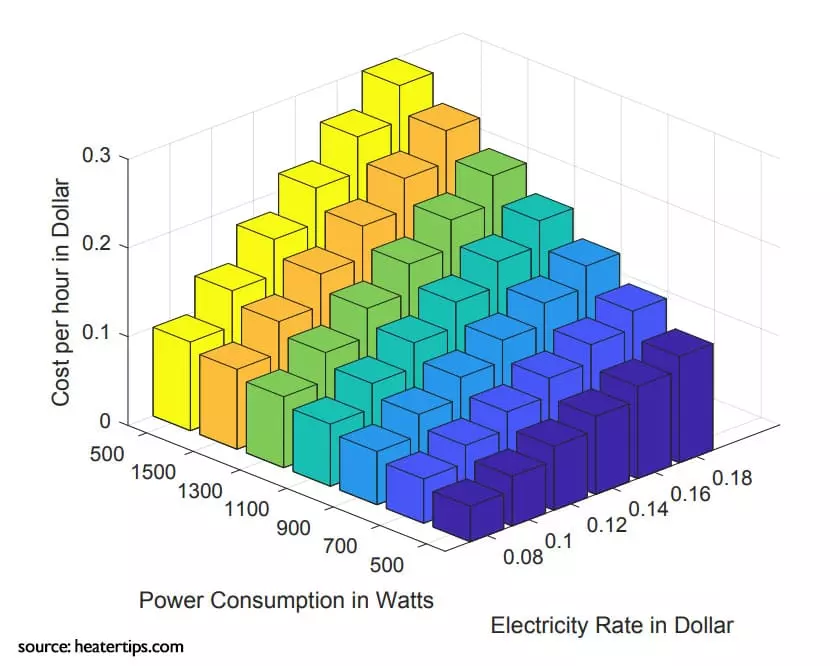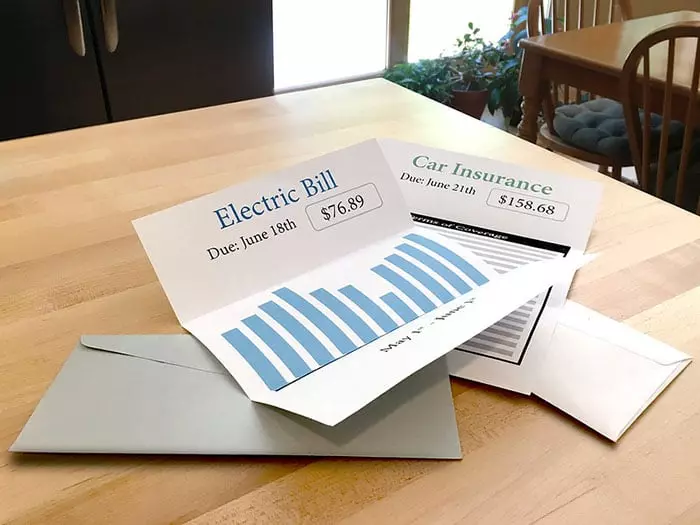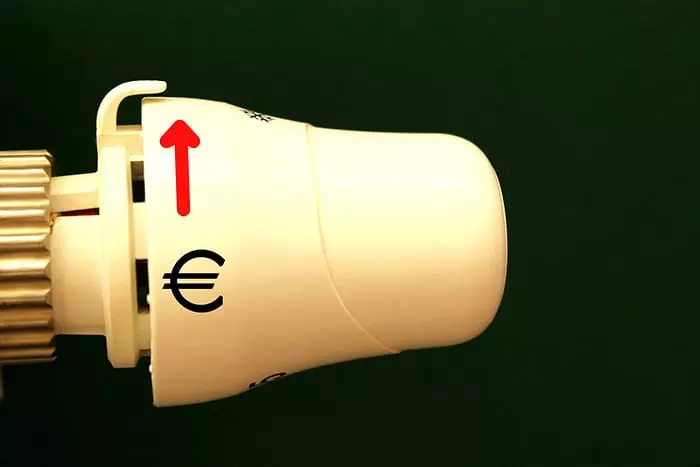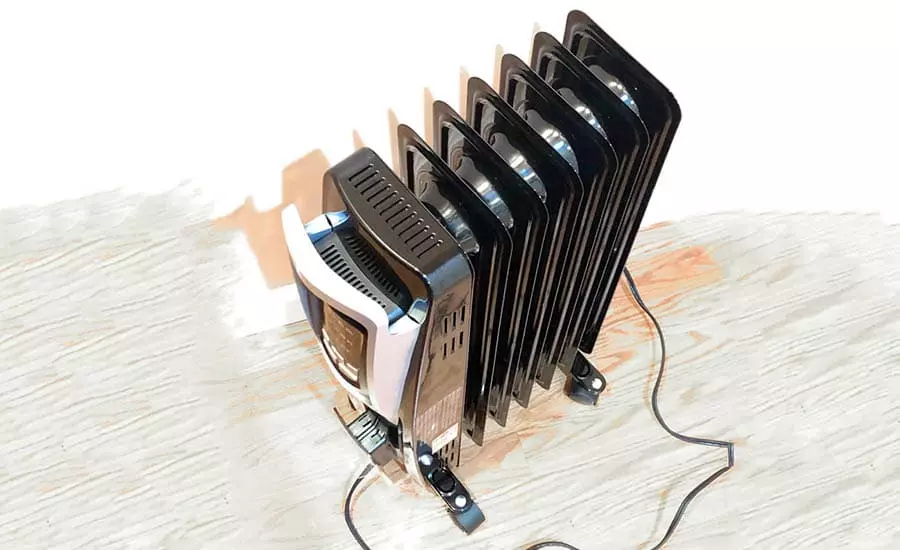This guide is all about the electricity usage of oil heaters. You are probably about to get a new space heater and wondering whether getting an oil heater is the right choice for you. Oftentimes, you have several concerns when you’re about to get a brand new heater.
- How much electricity do oil heaters use?
- Is it expensive to run an oil heater continuously?
- Are oil heaters more efficient than other types of space heaters?
- How can you reduce the electricity usage of your oil heater?
In this article, we’re going to tackle all these questions (and even more)! And don’t worry. You don’t need to be an electrician to be able to follow along. I’ve made this guide as easy and beginner-friendly as possible. All you have to do is to read through it and cherry-pick the information you need.
In my experience, oil heaters are among the best types of heaters you can buy. You just need to know the right information before you get one, so you can use it in an energy-efficient way. After reading this article, you’ll know EVERYTHING about the electricity usage of oil-filled radiators.
So let’s start turning you into an expert.
How much electricity do oil heaters use?
Here’s the short version: Oil heaters generally use 1500W of power. But the exact amount depends on how you use your space heater. You can influence the electricity usage of an oil heater a lot by simply tweaking the temperature settings and using it in the right spots.
Most space heaters, not just oil heaters, run on 1500W. But with oil heaters, you are still able to impact the electricity usage to be lower than that. We’ll cover how later on.
As always, there are also some exceptions. So-called mini oil heaters use just 700W of power. They are designed to heat rather small rooms or just to keep your feet under your desk warm. So, let’s just assume that the space heater you want to get uses 1500W.
To have a better understanding of how much 1500W actually is, here are a few examples:
Running a 1500W oil heater is the equivalent of powering 3 desktop gaming computers or two vacuum cleaners at the same time.
Understandably, and I totally agree with you, this sounds like a lot. But don’t worry, later on, we’ll cover the costs and you’ll see, that it’s not as bad as you think.
Do other space heaters use less electricity?
If oil heaters use 1500W of power, and that’s the equivalent of two vacuum cleaners at the same time, maybe a thought pops up in your head questioning whether you should get another type of heater.
Sadly, that’s not an option. Nearly all other space heaters use 1500W as well. You can go online and check the wattage of different heaters and you’ll quickly know that it’s true.
If you already have a space heater at home, you can find the wattage rating on the packaging or in an online manual.
Nearly all space heaters use 1500W because that’s the maximum power you should pull from a wall plug. And manufacturers want to produce heaters that can heat as effectively as possible. So they max out the power usage. On top of that, heat is the most “expensive” form of energy. It takes a lot more power to heat a room than to illuminate a room.
Anyways: Oil heaters stand out from the crowd.
In contrast to many other heater types, they oftentimes come with a very reliable and precise thermostat.
Oil heaters are much better at picking the right temperature settings and controlling the temperature in a room, whereas other types of heaters easily produce more heat than you actually need.
That’s why oftentimes you’ll find a decrease in cost when you switch over to using oil heaters. Later on, we will cover how and where to use oil heaters to save money.
The electricity usage of an oil heater depends heavily on where you use it. So keep reading.
How much does an oil heater cost to run?
Okay, so we’ve already covered the basics of oil heater electricity usage and why oil heaters are sometimes the better choice compared to infrared, ceramic or gas heaters.
So, let’s find out how much an oil heater actually costs to run.
By assuming that your space heater runs on 1500W, we cover nearly every oil heater out there. Still, there are some exceptions like 700W oil heaters or heaters, where you can customize the power settings.
Now, the average electricity rate in the US is at about $0.12 per kWh, which means that running a 1000W (or 1kW) device for one hour will cost you $0.12.
I’ve already done all the work for you. Here’s a complete table of different space heater wattages and electricity rates, so you can look up how much your oil heater will cost you to run per hour.
Wattage / Rate$0.08$0.10$0.12$0.14$0.16$0.18$0.20500W$0.04$0.05$0.06$0.07$0.08$0.09$0.10700W$0.056$0.07$0.84$0.98$0.112$0.126$0.14
900W$0.072$0.09$0.108$0.126$0.144$0.162$0.181100W$0.880$0.1100$0.132$0.154$0.1760$0.198$0.221300W$0.104$0.13$0.156$0.182$0.208$0.234$0.261500W$0.12$0.15$0.18$0.21$0.24$0.27$0.30
If you are the more visual type of person and you prefer seeing images rather than a table, here’s a 3D chart that I have created for you. It contains exactly the same data as the table above and you can use it to look up your oil heater cost per hour.

As you can see, depending on your electricity rate and your power settings, your space heater can cost anywhere from $0.04 to $0.3 per hour. And I didn’t even include the whole range of possible costs.
For example, in European countries (and very few US states), electricity rates up to $0.30 per kWh are possible as well.
To find out how much your heater costs to run, you need to know both parameters: Your electricity rate and the power consumption of your heater. Finding the wattage of your space heater is easy. Either you already know it, or you can quickly look it up online or in the manual.
To find out your electricity rate, the best way is, of course, to dig up your last electricity bill and check the rate they charged you.
But if you’re not sure where to look, or if finding your most recent electricity bill would be a mess, then you can go an easier route. You can take a look at my article about space heater electricity costs (click here to view it). It contains an infographic, which shows you all the US states together with the average electricity rates there.
Then, simply look up the state you live in and once you found it come back to this article. Just use the table above to look up your hourly space heater costs then.
Is an oil heater expensive to run?
Wait, we just covered exactly how much an oil heater costs you. Why is there another section about whether using an oil heater is expensive to run? Well, it’s because knowing the cost of your space heater is just one side of the coin. Let’s take a look at the other (better) side.
The question about whether using space heaters is expensive usually comes up right before you’re buying a new model. The answer is: It depends. Obviously, you can run an oil heater on different power levels and in different parts of your home with different insulation levels. All of these factors impact whether your heater is going to be expensive or not.
Generally, using a 1500W oil heater is not more expensive than using your regular central heating radiator. To be very precise, an average oil heater that you run for 8 hours every day, will cost you about $43 of electricity cost per month.
Of course, this appears expensive at first. You could also pay your gym or your Netflix subscription using this amount of money. But the reality looks different. Here’s what most people overlook:
First, no oil heater will power through 8 hours continuously on full heat. An oil heater, for example, uses its thermostat to control the temperature and to use the right power level to efficiently reach the temperature you set. It only has to heat up once and then use less power to retain the heat. Only when you open the windows, the power usage goes back to full heat.
But that’s also true for other heaters. No one will blast an infrared heater for 8 hours and nobody will fire up a propane heater for 8 hours on full power.
This means, that most likely, it will cost you less than the monthly $43 I just mentioned to heat your home.
As you see, the expenses of your oil heater can’t really be calculated beforehand without knowing your usage and how the space heater reacts to certain conditions.
Later on, I will show you how you can use your oil heater to minimize the expenses significantly.
And still, that’s not the whole story. There’s another reason oil heaters are not as expensive as you think.
How an oil heater affects your utility bills
Many people feel anxious when they get their first space heater, power it throughout the winter and then check their electricity bill.
How much is it? For some people, it can definitely go above $200 or even $350. Especially if you heat your whole home using just space heaters. Of course, that sounds shocking at first. But here’s why the rising costs shouldn’t bother you.
The reason many people think that space heaters are a waste of energy is that they look at the increase in their electricity bill and panic. However, nearly everybody misses the point that the heat you produce using your space heater doesn’t need to be produced by your central heating system any more.
Meaning that what you previously paid for heating bills decreases, while your electricity bill increases. You are just shifting the costs.
Using a space heater causes the shift of your expenses from your heating bill to your electricity bill. But in total, not much changes. The only thing that’s different now is that instead of using fuel to produce the heat, you use electricity. It’s as simple as that.
Total Utility Bill Expenses
So, do space heaters increase or decrease your total costs? This depends heavily on the state you live in. Running a space heater instead of a fuel-powered central heating system is most likely still more expensive because electricity rates are higher than fuel rates.
Still, your total costs don’t rise as much as you previously expected them to. And now you know why. You just shift the expenses from one bill to another. What you pay more on electricity, is what you save on the heating bill.
I believe, that in the future, the generation of electricity might become even cheaper, especially compared to oil prices. That’s why electric heaters are the future - but we’ll see. I don’t have a magic glass ball.

Oil-Filled Radiator Efficiency
Here’s the part of the article that contains the most important insights you can possibly get about space heaters. In this section, you’ll learn to understand key aspects of heating efficiency and saving money long term. Stay tuned.
The efficiency of your oil heater depends heavily on 4 different things. After reading it, you’ll know exactly how to choose and use the right oil heater.
Choosing brands
The first question that might pop up is: Is there any significant difference between running a brand oil heater and other (non-brand) models? Do brand models use less energy? Are they better at saving electricity?
The quick answer is: No, brand products are in no aspect better in saving electricity than other heaters. Even though many people believe they get a better, more efficient oil heater when they pick a brand product, that’s not the case in reality.
Oftentimes, DeLonghi heaters are way more popular than other, smaller brands, like Pelonis. Even though you pay up to 50% for a very similar model with exactly the same features.
On my “recommended products” site, I wrote a definite guide on the (in my opinion and in my experience) best oil heater (by far) - and guess what. It’s NOT a brand product.
If you want to know which oil heater is the best value for your money (and I’m 100% sure with this one), here’s the full article on My all-time favorite Oil Heater! (click to view the article).
Whether you pick a brand model, like a DeLonghi oil heater, does not a difference regarding energy consumption at all. It doesn’t even make a difference in safety and functionality. Picking a heater that is popular and well-tested by the public (I mean a model with as many reliable reviews as possible) is the right way to go.
Brands have absolutely no impact on the efficiency of an oil heater.
Where to use oil heaters
Here’s something that definitely has an impact on your space heater efficiency: The location you try to heat.
And again, that’s something only few guides cover. Luckily, you’re reading this right now and you should know that you’re in the right place.
Here’s the important part:
Each space heater has its own application in which it outperforms all the other types of heaters. For example, an infrared heater is better than any other heater at heating outdoor locations, such as uninsulated garages or party tents. The reason is that infrared heaters use radiant heat, which is a kind of heat that can’t be blown away by the wind.
The nature of the technology of an infrared heater defines where it is better than other heaters. The same is true for oil heaters and every other heater type.
An oil heater, for example, is not useful outdoors at all. It would be a total waste of energy. Because oil heaters attempt to heat the air, the heat they produce is quickly carried away with the wind. So, oil heaters are the worst heater choice when you want to heat an outdoor location.
But what are oil heaters good at?
Oil heaters are better than any other type of heater in heating a large, closed room continuously for long periods of time. Because oil heaters heat the air, the heat will feel much more natural - not like radiant heat.
Oil heaters can run for very long times continuously (because they don’t get dangerously hot). This makes them the best type of heater for heating overnight. The thermostat of oil heaters is also way more reliable than that of other heater types.
Also, oil heaters are the safest type of heater: They don’t get hot to the touch and come with plenty of safety features. Which makes them the best heater choice for indoor heating with kids and pets.
There’s no heater that is as good in replacing a regular central heating radiator than an oil-filled electric heater. They do the exact same job. The only difference is that they are powered by electricity instead of fuel.
Thermostat Efficiency
Oil heaters have one more tremendous advantage over other heater types: Their thermostats work way better.
To understand why here’s a simple explanation. A thermostat always needs two inputs. The first one being the current measured room temperature and the second being the current set temperature (the temperature you set using the thermostat interface, most likely a display).
Using these two parameters, the thermostat can always decide how to control power usage to heat efficiently.
Here’s an example:
When the measured room temperature is lower than the set temperature, the heater knows that it has to increase the power.
What separates oil heaters from other heaters is that they can much more precisely measure the current temperature. Either they measure the oil temperature directly, or they measure the temperature of your room.
In contrast, infrared heaters would have more difficulties. They don’t heat the air, because they heat using radiation, so they can’t really know what the current temperature is.
That’s why oil heater thermostats are better. They can more accurately measure and predict the best ways to control the heat.
More efficient thermostats will also mean less power usage and thus higher energy savings.

Difference between oil heaters and other electric heaters
There are quite some differences between oil heaters and other space heaters. Here are some of them.
- Indirect heat: Oil heaters heat in two stages: Meaning they first heat the oil, and then the oil heats the air of your room. At first, that sounds like you waste energy. But that’s not the case. All the heat eventually reaches your room, just at a slower pace.
- Weight: Also, oil heaters are much heavier than other heaters, because they consist of a heavy metal body that carries the oil. Which in turn makes oil heaters less portable, but more durable.
- No moving parts: Oil heaters don’t have any moving parts, like fans or motors, which is why they don’t wear off at all. There are no parts that cause friction and rub against each other. Also, there’s no single spot where a lot of heat accumulates. Meaning that no parts will ever melt.
- Silence: Because there are no moving parts, oil heaters are absolutely silent. There’s no humming or buzzing as with infrared heaters and no blowing fan as with most ceramic heaters.
- Thermostat: Also, because they nearly always have better thermostats, oil heaters don’t turn on and off over and over again. They’re able to control the temperature in a smooth way.
- Safety: On top of all these advantages, oil heaters are also safer, because there’s no overly hot spot. The heat distributes over the whole metal body, which makes them absolutely safe to touch, even when they run on full heat.
How to reduce the electricity consumption of your oil heater
Here are 5 tips on how you can decrease the electricity consumption of your oil heater.
1. Use it in the right spots
As we already discussed, using an oil heater outdoors makes absolutely no sense. The heat gets carried away quickly.
Similarly, oil heaters are not the best choice for uninsulated rooms. Any insulation issue will also carry away the warm air. Use oil heaters only in closed, insulated rooms.
That’s where you can benefit most from them. That’s where oil heaters can play with their advantages.
Infrared heaters are great for the most part of your home. You can use one in your living room, your kitchen or your bedroom. Just avoid using it in an uninsulated garage, a workshop, your basement or your attic. These places often lack insulation and make heating with an oil heater inefficient.
2. Set the thermostat
“For every degree, the thermostat is raised, 4% to 8% can be saved.” Department of Natural Resources Lousiana - Adjust your thermostat
While the department in the quote above was talking about cooling costs (like for air conditioning), the very same is true for space heaters as well.
A simple decrease in the set thermostat temperature by just one single degree will lead to a 4% save of heating cost.
So, set the temperature according to your needs and don’t be wasteful. When you set your temperature too high, your oil heater will run on full power for much longer, because it needs to compensate for higher cool-down rates of your room. More heat means more reheating, which will raise your energy bill. That’s why energy costs don’t rise linearly (doubled temperature leads to double cost), but quadratically or exponentially (doubled temperature leads to quadrupled cost).
3. Don’t run on full power
If you have an oil heater without a thermostat, but with different power level settings, don’t pick the highest setting.
The highest power level (1500W) is only necessary in sub-zero temperatures and you can easily save money by avoiding it. You don’t even give up comfort.
4. Improve insulation
“EPA estimates that homeowners can save an average of 15% on heating and cooling costs (or an average of 11% on total energy costs) by air sealing their homes” energystar.gov
Insulation is one of the most important aspects when it comes to heating. And the best thing about it is, that you insulate only once, but you benefit from it for a lifetime.
Insulation will only cost you once, but because of it, your lifetime utility expenses will drop by 11%.
How awesome is that?
5. Wear warm clothes
By wearing warm clothes, you effectively minimize the amount of heating you need. And as you have seen in the first tip, reducing the temperature can save you significant amounts of money.
And it’s extremely easy to do. I mean, you already have the clothes in your closet. So, why don’t you put on a new layer of clothes (e.g. a hoodie) and decrease the temperature?
It will save you money. By the way, here’s a big article on the 21 cheapest ways to heat.
Are oil-filled heaters cheaper to run than other space heaters?
Here’s the conclusion. From everything we covered in this article, we can tell that yes, oil heaters are cheaper to run than other space heaters.
But it depends on several aspects.
If you use your oil heater in insulated closed rooms, oil heaters are the very best choice.
On other occasions, another heater type might be the better choice. You can check out different heaters at the recommended products page (click here to view it). You’ll find the most important heater types together with in-depth reviews and the best ways to use them to heat as cheaply as possible.
